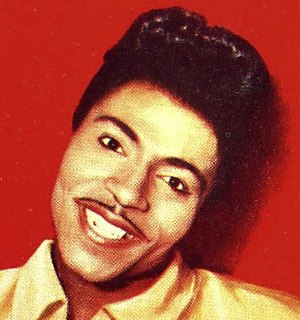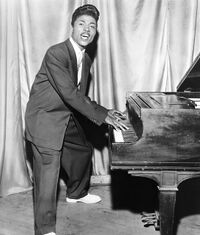Little Richard: Difference between revisions
No edit summary |
No edit summary |
||
| (One intermediate revision by the same user not shown) | |||
| Line 1: | Line 1: | ||
[[File:Remnick-LittleRichard.jpg | 200px | right | thumb |Little Richard]] | [[File:Remnick-LittleRichard.jpg | 200px | right | thumb |Little Richard]] | ||
[[Category:Influences on Morrissey - Music]] | |||
== Relevance == | == Relevance == | ||
{{Page | {{Page | ||
|RelatedForumThreads=146403 | |||
|DiscogsArtistId=223473 | |DiscogsArtistId=223473 | ||
|WikipediaPageTitle=Little_Richard | |WikipediaPageTitle=Little_Richard | ||
}} | }} | ||
{{PageDate}} | |||
Latest revision as of 20:30, 4 May 2024
Relevance
Mentioned In
Discogs Information
Profile
American singer, songwriter, pianist and recording artist (born 5 December 1932 in Macon, Georgia, USA - died 9 May 2020 in Nashville, Tennessee, USA).
Inducted into Rock And Roll Hall of Fame in 1986 (Performer). Inducted into Songwriters Hall of Fame in 2003.
External Links
- https://www.discogs.com/artist/223473-Little-Richard
- https://en.wikipedia.org/wiki/Little_Richard
- https://www.imdb.com/name/nm0005153/
- https://adp.library.ucsb.edu/names/205886
Wikipedia Information
 |
Richard Wayne Penniman (December 5, 1932 – May 9, 2020), known professionally as Little Richard, was an American singer, pianist, and songwriter. He was an influential figure in popular music and culture for seven decades. Described as the "Architect of Rock and Roll", Richard's most celebrated work dates from the mid-1950s, when his charismatic showmanship and dynamic music, characterized by frenetic piano playing, pounding backbeat and powerful raspy vocals, laid the foundation for rock and roll. Richard's innovative emotive vocalizations and uptempo rhythmic music played a key role in the formation of other popular music genres, including soul and funk. He influenced singers and musicians across musical genres from rock to hip hop; his music helped shape rhythm and blues for generations. "Tutti Frutti" (1955), one of Richard's signature songs, became an instant hit, crossing over to the pop charts in the United States and the United Kingdom. His next hit single, "Long Tall Sally" (1956), hit No. 1 on the Billboard Rhythm and Blues Best-Sellers chart, followed by a rapid succession of fifteen more in less than three years. In 1962, after a five-year period during which Richard abandoned rock and roll music for born-again Christianity, concert promoter Don Arden persuaded him to tour Europe. During this time, the Beatles opened for Richard on some tour dates. Richard is cited as one of the first crossover black artists, reaching audiences of all races. His music and concerts broke the color line, drawing black and white people together despite attempts to sustain segregation. Many of his contemporaries, including Elvis Presley, Buddy Holly, Bill Haley, Jerry Lee Lewis, the Everly Brothers, Gene Vincent, Pat Boone, and Eddie Cochran, recorded covers of his works. Richard was honored by many institutions. He was inducted into the Rock and Roll Hall of Fame as part of its first group of inductees in 1986. He was also inducted into the Songwriters Hall of Fame. He was the recipient of Lifetime Achievement Awards from The Recording Academy and the Rhythm and Blues Foundation. In 2015, Richard received a Rhapsody & Rhythm Award from the National Museum of African American Music. "Tutti Frutti" was included in the National Recording Registry of the Library of Congress in 2010, which stated that his "unique vocalizing over the irresistible beat announced a new era in music".
Related Forum Threads
- [Morrissey Central] "Some Gave All." (May 9, 2020) - Morrissey-solo (May 09, 2020)
